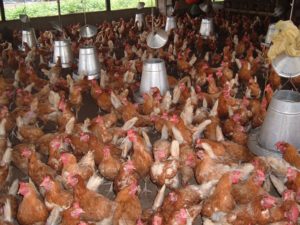
Nairobi. Kenya//-Governments around the world, including China, the US, India and the EU, are fueling deforestation by subsidising factory farms – a new report from World Animal Protection reveals.
Launching ahead of COP30, ‘Subsidising Factory Farm Harm’ unpacks the magnitude of subsidies flowing into factory farms, leaving small-scale farmers behind and farmed animals trapped in cruel factory farms.
Agriculture already accounts for up to 34%[1] of global greenhouse gas emissions, yet receives among the highest subsidies of any sector, second only to fossil fuels [2].
In Africa, governments spend significant portions of public agricultural budgets on input subsidies that primarily benefit large-scale or industrial producers rather than supporting smallholder farmers who feed most of the continent.
Kelly Dent, Director of External Engagement at World Animal Protection, said: “We can’t keep pouring taxpayer money into food systems that are not fit for purpose. Factory farms pollute our climate, destroy biodiversity and put animals through immense suffering. The future is in fair farms, not factory farms.
“Governments need to redirect subsidies away from factory farming. Public finance should drive sustainable and humane food systems, but right now we’re being locked into harmful ones.”
Key Facts:
- If left unchecked, agriculture is projected to produce 52% of global greenhouse gas emissions by 2050.
- Subsidised production of beef, soy (for animal feed), and palm oil drives about 14% of global deforestation[3].
- In Brazil, home to COP30, the subsidies granted to the beef sector is on average roughly $3.1 billion per year when the industry pays only about $3.8 billion USD annually in taxes.
- In the EU, redirecting half of the USD 88.5 billion given annually to factory farms could save 25 million megalitres of water and 19 million hectares of land each year.
- In Kenya, farms integrating crops, bees, chickens, goats, and cattle have shown that agroecological systems can deliver both profitability and sustainability, while cutting chemical use and improving animal welfare.
Across Africa, redirecting harmful subsidies can make agriculture more inclusive and resilient. A shift towards agroecology and humane farming systems can create jobs, protect biodiversity, and build a food-secure future for the continent.
World Animal Protection calls on African leaders attending COP30 to:
- Phase out harmful agricultural subsidies that fund industrial livestock expansion.
- Redirect public funds towards smallholder farmers, agroecology, and humane, sustainable food systems.
- Integrate subsidy reform into climate commitments (NDCs) to align with the Kunming-Montreal Biodiversity Framework.
- Support farmers and workers through training, innovation, and social protection as part of a just transition.
Sally Kahiu, the External Affairs Lead at World Animal Protection saids, “Factory farms are driving deforestation, pollution, and cruelty. It’s time African governments stop funding destruction and start investing in solutions by redirecting subsidies towards humane and sustainable farming systems such as agroecology which empowers smallholder farmers, protect ecosystems, and strengthen food security. Our governments have the chance to support Africa-led solutions to global challenges” To access the full research, click here.


